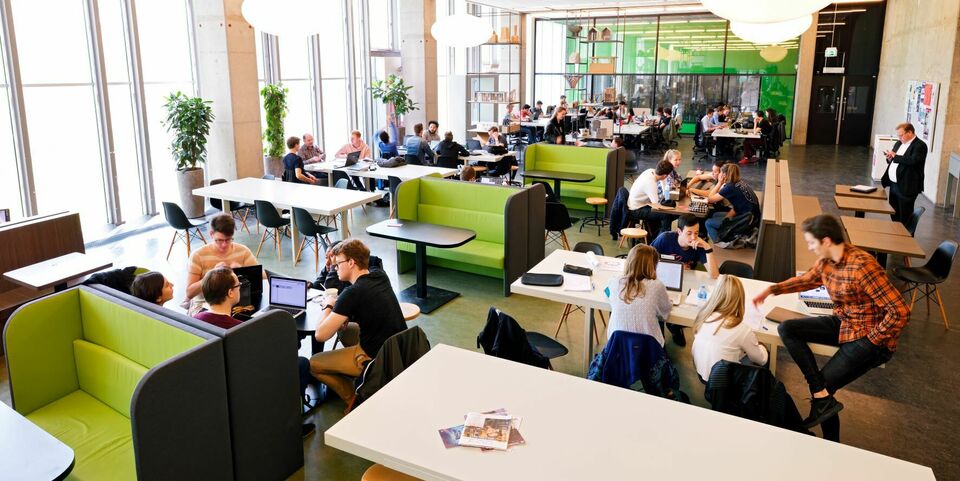Shortage of facilities is being tackled
Not every issue listed by student faction Groep-één in their overview of TU/e’s facilities shortage in early June can be remedied in the short term; but for a number of issues, solutions have already been found. Roel Hazelhof, council member for Groep-één, is very pleased with how quickly and attentively the responsible departments responded to the situation. He also points out the students’ personal responsibility with regard to reserving rooms.
In collaboration with the study associations, Groep-één had drawn up an overview of what students were lacking on campus in terms of facilities. The result was a long and diverse list which was discussed during a meeting on Thursday 30 June, with the representatives of the departments involved.
Roel Hazelhof from Groep-één sat down with Monique Kuyck from the Facility Management Center (FMC) and Anne van Dortmont from Real Estate (RE) to discuss the matter. Together with Hazelhof and Kuyck, Cursor goes through the list. Kuyck explains that one of the quick solutions was to arrange for a receptionist to be present in the Traverse building, which currently houses Mechanical Engineering’s study association Simon Stevin, to let people out of the building on Thursday evenings during the association’s drinks. Another thing that will be rapidly addressed is the lockers in this building, as a number of them are not usable for various reasons, mostly the locking system, which is why there is a shortage at the moment. “We’re in the process of purchasing new locks that we plan to install on all the lockers on campus in the near future”, Kuyck says. “Including the ones in the Traverse building.”
Communication
Unfortunately, not every problem can be solved as easily or as quickly. Kuyck understands students’ complaint that they cannot always attend classes in the building that also houses their study association, “but some buildings simply lack the space to make that possible. In that case, students will have to go to another building. This also depends on what has been agreed upon in TU/e’s spatial planning vision regarding the layout of our campus.”
Sometimes, a lot of tension can be lifted through better communication about what exactly happened to certain study facilities, Hazelhof says. “For example, many students in Flux were surprised by the reduction of study places in that building. They only realized this when they came back to campus after the pandemic. No one had informed them of it beforehand. That quickly led to confusion and frustration.” Kuyck thinks the that Covid-19 pandemic has increased the gap between the departments and the users of the facilities – in this case, the students. “In those two years, a lot has changed on campus, and we now have to make up for the delay in communication.”
Hazelhof and Kuyck have made clear agreements on this front. Kuyck has offered to act as a contact person for the student associations and student factions when dealing with these kinds of facility issues. “I won’t be able to solve everything on my own, but if I can’t do it myself, I know who to turn to”, says Kuyck. She adds that it is also possible to report many issues centrally and online via Facilitator (only accessible via TU/e’s intranet, Ed.).
Personal responsibility
Finally, both Hazelhof and Kuyck want to comment on students’ and employees’ personal responsibility in this matter. Hazelhof: “Students and staff also need to act responsibly when reserving rooms and cancel them if they’re not using them, or else many rooms will be left unused every day and won’t be available to those who need them.”
Kuyck adds that certain ways of working during the pandemic, via Teams meetings for example, cause a negative effect in this regard. “For example, if a group of employees or students choose to have a Teams meeting while five of them are present on campus that day, all five of them will reserve their own separate room and sit there by themselves. If they were to make better arrangements among themselves beforehand, i.e., ensure that all five of them are in one room together, that would save us four extra rooms.”
The Planon reservation system will undergo an upgrade in early July, says Kuyck, “and hopefully, that will improve its functionality. Looking to the future, we want to purchase a new reservation system. In mid-2023, a tender will take place for the purchase of a new facilities management system which, for example, includes BookMySpace now. We will also involve students and staff in this, and a detailed Plan of Requirements will be drawn up accordingly.”


Discussion